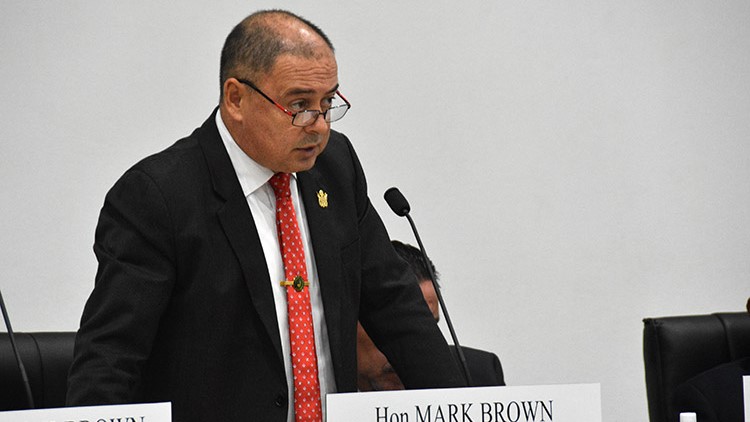2022/23 Budget is ‘bit tighter’: PM Brown
Saturday 21 May 2022 | Written by Caleb Fotheringham | Published in Economy, National

Prime Minister Mark Brown in Parliament making his 2021-22 budget speech last year. Photo: CI NEWS/21060843
In lead up to the tabling of the country’s 2022/2023 Budget on Monday, the Prime Minister gives a sneak peek into what it will look like and stakeholders weigh in with what they want to see.
Prime Minister Mark Brown told Cook Islands News on Friday that government ministries won’t have a reduction in allocated funds in the upcoming budget.
Brown said while it was difficult to not overspend, the end result was fiscally responsible.
“This budget is a bit tighter, we’re coming back from an economy that was half a billion dollars to just over $300 million,” the Prime Minister said.
“We’re in a fiscal environment that we’re trying to regrow, to get back, and having additional requests for funding is going to be difficult to accommodate until we get our economy back up to pre-Covid levels.”
Leader of the Opposition Tina Browne said the Democratic Party wanted to see “solid creative thinking”.
“Not more of the same old, same old. Dollars are very scarce at this present time in our national coffers and prudence must be exercised at every step and at all levels.”
Browne said there had been little evidence of Government’s “much-promised diversification” and no lessons were learnt from over-reliance on tourism.
“Currently, we have gone back to relying on tourism again, when we should’ve learnt not to do this following our experience with Covid-19 – we just can’t pin all our hopes on tourism, that would be very unwise.
“What the Opposition would like to see in the new budget is less money being spent on non-priority areas, like travel, and more spent on fixing big problems on Rarotonga like our full to capacity waste facility and actioning good solutions, such as the installation of clean burning waste incinerators.”
Browne said she would like to see income generating export crops that can be grown in the Pa Enua.
Temarama Anguna-Kamana, head of the Ministry of Agriculture responsible for promoting the industry including export crops in the Cook Islands, said she was not expecting any surprises in the budget.
Anguna-Kamana said she expected to receive sufficient funds for staff and operations.
Cook Islands Chamber of Commerce chief executive officer Rebecca Tavioni said returning to normal should be the priority of the budget.
Tavioni said she would like to see no drastic change in the cost of doing business.
Tourism Industry Council president Liana Scott said her industry had to make some significant savings over the last two years and would like to see government also consider being “more thrifty”.
Scott suggested the government could save by centralising services and cutting down on unnecessary expenses like vehicles.
“Areas we would like government to consider support, is in destination development – funding areas where the island is enhanced, not just for visitors, but also for its residents.
“Sanitation and waste management needs to be on the top of the list of the capital investment.”
Scott, who is also the general manager of the Muri Beach Club Hotel, said sustainable eco focused tourism needed to be nurtured. She also said private sector investment needs to be a priority.
“Outer island development in private sector areas such as agriculture and the like will ensure these islands are able to contribute towards the economy.
“Year-round travel is necessary to ensure the island enjoys good yields – focus is going to be required on getting a suitable North America/Europe connection and/or direct flights from other countries besides NZ.”
Out on the street at the Punanga Nui Market, people wanted money set aside for education, dental and health.
One person wanted to see money allocated into supporting people get into apprenticeships and also a welfare system for the unemployed.
“If they (people unemployed) have something to fall back on like the unemployment benefit they will stay here and do part time.”












































